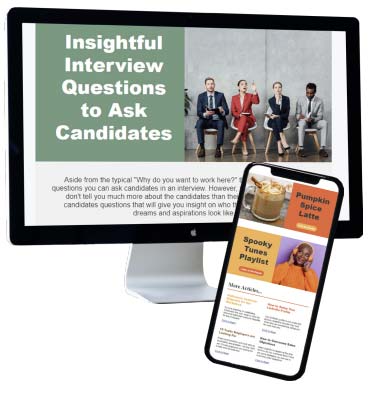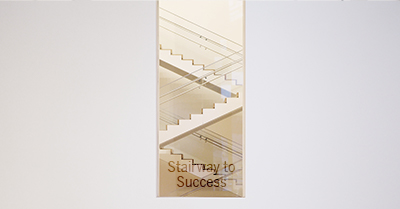Before You Go!
Sign up for our newsletter - which features professional templates, job market updates, articles, playlists, recipes, and more, sent directly to your inbox!



If I were to ask you what your strengths were, what would you say? Most people are either unaware or unable to describe their strengths accurately because they often confuse them with talents or skills. As described by psychologist Martin Seligman, strengths are traits that can be acquired and often have to do with your character, while talents are inherent. They are things like critical thinking, adaptability, or your ability to connect. Strengths are your combination of skills, knowledge, and talents (along with the time invested to develop these things) and they are what will propel you forward in the workplace.
In order for you to leverage your strengths, you first need to identify them & then understand how exactly they are helping you along your career path. Your investment in your strengths is what helps you acquire, nurture, and grow them in order to leverage your success.

We all want to get ahead in our careers and many people will do this by focusing on improving their weaknesses rather than their strengths. While focusing on your weaknesses can help you improve in certain areas, it won’t be what will help you advance your career. Staying away from or delegating tasks that fall under your weaknesses will allow you to work on things that are your strengths, leading to a larger impact within your organization.
Some of us don’t recognize that our unique qualities can be our strengths. We take these characteristics for granted and instead focus our energy on weaknesses, thus minimizing our own self-worth. When you accept and develop your strengths, they become assets that move you closer to reaching your goals. Knowing your strengths helps you realize this and reminds you that your contributions are unique and valuable to your organization and yourself.
Have you ever noticed that when you are doing what comes naturally to you, time flies by? Knowing your strengths has the same effect. Even if you are tired after a long day, when you’ve spent that day improving what you are naturally good at, there’s a sense of accomplishment and enthusiasm that you can’t explain. You are reminded of why you value your work and are excited for what comes next.
When you recognize your strengths, you’re also recognizing your own contributions at work. Knowing how you can help your organization grow in-turn helps you see and take advantage of the opportunities that are given to you throughout your career. It will help you make a larger impact where you are & will also help you identify new roles that allow you to utilize your strengths.
While it is important to know and develop your strengths, they can also serve as a telling factor for your weaknesses. Being aware of your strengths as well as your weaknesses helps you determine how to best help your organization and your career.

Identify your strengths yourself by taking a piece of paper and separating it into two columns. Title your first column “Strengths” and your second column “Weaknesses”. Then, for each column, list 10 to 15 things. Since we tend to focus on our weaknesses, listing them out will help you discover your strengths.
Once you have your list of strengths, ask yourself the following questions:
Another way of identifying your strengths is to ask your friends and colleagues to identify what they feel your strengths are. Everyone’s relationship with you is unique so your feedback might vary. What you should look for in the feedback are common traits or patterns that they have identified in you.
Online assessments are a great way to gain an objective list of your strengths. There are a variety of online assessments, quizzes, and tests. One that stands out is Redbull’s strength’s assessment at Wingfinder.com. This online survey assesses your strengths in four key areas: creativity (including curiosity), thinking (intelligence and fluid IQ), drive (ambition and motivation), and connections (interpersonal and self-management skills).
After your strengths are broken down, Wingfinder gives you recommendations for how you can improve and take advantage of these strengths.

Once you have a solid list of your strengths, the next step is to use them to improve yourself and further your career. First, ask yourself if your strengths align with your career path. If they do, then you’re already on the right path and it should be smooth sailing. If they do not, then you have to ask yourself, “Is this the right path for me?” and “How can my strengths help me get to where I want to be?” Reflecting on your own goals and how they align with your strengths will help you find value in your work and your choices.
Previously, we mentioned how weaknesses can help you find your strengths. However, don’t fall into the trap of focusing on your weaknesses. Developing your strengths is the best way to grow and reach your career and life goals. But how do you go about developing these strengths of yours? The following are a few ways you can leverage your strengths to help you on your career path.
Now that you know your strengths, find a group or a class that focuses on developing those strengths. For example, if you are naturally social and a strong leader, join a Toastmasters group to continue to develop your collaborative and public speaking skills.
If you feel that your current position does not best utilize your strengths, adjust your career industry, role, or employer to ensure your strengths are being put to their best use.
Think about how you spend your time. Are you using it to focus on what you are good at or are you getting hung up on what you can’t do? Ask yourself, “Is this the best use of my strengths?” If not, redirect your focus so you can make the highest level of contribution.
Being adaptable is extremely important in the workplace and in life. Being adaptable means allowing your strengths to grow naturally. When you focus on your weaknesses, you are limiting your strengths. Think more about your strengths and try not to limit yourself. If you are unsure about how you can be adaptable, try reading this article on being adaptable in a constantly changing work environment.
